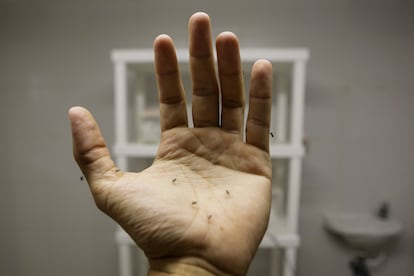Brazil planning to build the world’s largest anti-dengue mosquito macro farm
The goal of Luiz Inácio Lula da Silva’s government is to protect 70 million Brazilians from dengue fever by releasing modified insects in urban areas

From goats to sheep, pigs to chickens, and donkeys to sea bass, we humans have farmed and raised just about any animal we can reasonably coexist with. But mosquitoes? Those reviled blood-sucking dipterans that spread some of the deadliest diseases ever recorded in the history of medicine? Well, yes. That is exactly what Brazil is proposing to do as soon as it has built a brand-new macro farm that will manufacture five billion modified mosquitoes per year. And no, Lula’s government has not gone mad: its goal is to protect 70 million Brazilians from dengue fever and other mosquito-borne ailments.
The location for what will be the world’s largest mosquito factory has yet to be determined. Brazil is a very large country and I don’t know how many people will be overly enthusiastic about such a facility being built near their homes. But the health authorities have already approved the technique involved, as have those in the United States and a handful of other countries. The WHO is considering the matter but has not yet offered an opinion. The project is being carried out by the World Mosquito Program (WMP), a philanthropic entity led by microbiologist Scott O’Neill of Monash University in Melbourne, Australia, in collaboration with the Oswaldo Cruz Foundation in Rio de Janeiro. The two organizations have announced plans to release 50 billion modified mosquitoes over the next 10 years in urban areas throughout Brazil. The insects will be launched from cars, motorcycles and drones.
The key to the project is a naturally occurring bacteria called wolbachia, a parasite that has lost the ability to survive on its own and can only subsist inside insect cells. Like any good parasite, wolbachia has a special talent for making its host the kind of offer it cannot refuse. Some insects are unable to reproduce in the absence of wolbachia, and others cannot even survive without it. Any mosquito attempting to get rid of the bacterium signs its own death warrant, so wolbachia is guaranteed a stable presence within that dipteran population. It is a low trick on the part of the parasite, one that is very effective at all biological levels, from genes to societies.
The principal propagator (or vector, in the jargon) of dengue, which infects more than 400 million people in more than 100 countries each year, and kills around 20,000 annually, is the Aedes aegypti mosquito, a species that is not among those in which wolbachia proliferates. O’Neill and his team displayed the method of how to introduce the parasitic bacterium into Aedes cells some time ago. In limited field studies conducted in Australia, Brazil, Colombia, Indonesia and Vietnam, wolbachia-infected mosquitoes progressively infect native mosquito species. In the most successful of the trials, the result was a 77% reduction in the incidence of dengue among the human population. The reason for this is that wolbachia competes with the dengue virus in the demanding environment of the reproductive cells. The more Aedes carrying wolbachia, the fewer there are carrying the dengue virus. The mosquitoes still bite, of course, but they are not spreading dengue, or at least not on such a large scale.
The anti-dengue mosquitoes have been modified as they have had wolbachia inserted into them in the lab, but they are not genetically modified, WMP underlines. This point is debatable — wolbachia has 496 gene families — but it will certainly reduce the debate about tampering with the natural order of things by quite a few notches.
Sign up for our weekly newsletter to get more English-language news coverage from EL PAÍS USA Edition
Tu suscripción se está usando en otro dispositivo
¿Quieres añadir otro usuario a tu suscripción?
Si continúas leyendo en este dispositivo, no se podrá leer en el otro.
FlechaTu suscripción se está usando en otro dispositivo y solo puedes acceder a EL PAÍS desde un dispositivo a la vez.
Si quieres compartir tu cuenta, cambia tu suscripción a la modalidad Premium, así podrás añadir otro usuario. Cada uno accederá con su propia cuenta de email, lo que os permitirá personalizar vuestra experiencia en EL PAÍS.
¿Tienes una suscripción de empresa? Accede aquí para contratar más cuentas.
En el caso de no saber quién está usando tu cuenta, te recomendamos cambiar tu contraseña aquí.
Si decides continuar compartiendo tu cuenta, este mensaje se mostrará en tu dispositivo y en el de la otra persona que está usando tu cuenta de forma indefinida, afectando a tu experiencia de lectura. Puedes consultar aquí los términos y condiciones de la suscripción digital.









































